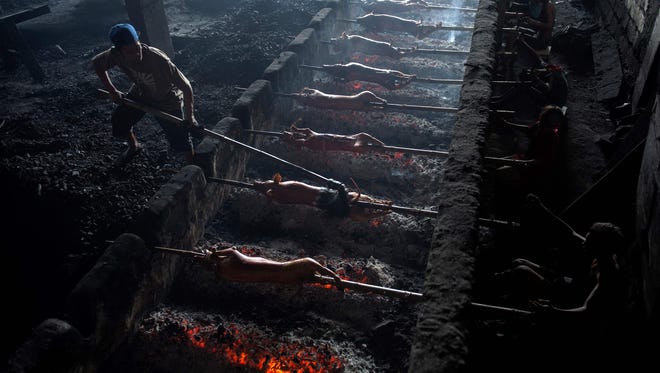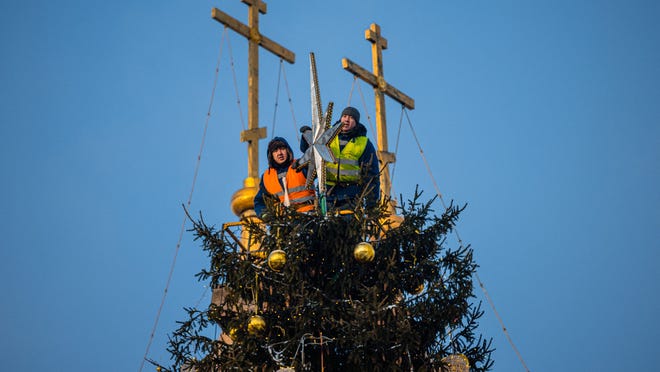- Nochebuena translates to “good night” and is celebrated on Christmas Eve.
- The holiday dates back to the Spanish colonization and the celebration of the birth of Jesus Christ.
- Nochebuena is not only a Hispanic and Latin holiday, but it is also celebrated in the Philippines.
As night falls on Christmas Eve, most American children head to bed hoping to see what Santa has laid down overnight, while parents and adults alike put the finishing touches on it. that they hope will be a magical Christmas morning.
But for the Latinx, Hispanic and Filipino community, the party is already underway, with tamales, adobo, lechón and pancit on the bridge.
Nochebuena, which translates to “the good night”, is an annual holiday in which some communities celebrate Christmas on the night of December 24 instead of December 25. While the traditions and celebrations of the night may vary depending on the culture and region, one common theme remains: it’s about being together.
“It’s only a couple of times a year that you get the whole extended family together,” Alexandro Gradilla, associate professor of Chicago and Chicano studies at California State University, Fullerton, told USA TODAY. “It’s really not just a vacation of love, but it’s also a really vacation of peace.”
There are many different ways to celebrate Nochebuena, but it all dates back to one source: religion and Spanish colonization.
When the Spaniards arrived in the Americas from the late 1400s, they also brought Catholicism, which sees Christmas as the day of the birth of Jesus Christ. The celebration begins around midnight, as it is believed to be the hour at which Christ was born. Today, some attend church for nine consecutive nights, culminating with Mass on Christmas Eve night or at midnight on December 25.
However, Gradilla said the indigenous peoples of the Americas have long celebrated the Winter Solstice, which usually occurs a few days before Christmas. The two celebrations intertwined to form their own unique event.
“People bring elements of their own seasonal practices that predate Spanish colonization and the introduction of Catholicism,” he said. “It’s a hybrid between the celebrations people used to have.”
Why do we kiss under a parasite? :The origins of mistletoe explained
“Please no more snowflakes. “:Make your holiday nails with these artist tips and tricks
Nochebuena is not just a Latinx vacation
The holiday has long been considered a Latinx celebration, but across the Pacific Ocean, the Philippines has also celebrated Nochebuena for centuries.
Much like the Americas, the Philippines was under Spanish colonization, which began in the 1500s and lasted almost three centuries. Throughout history, many different nations have influenced Filipino culture, but one thing has remained religion. Today, about 86% of the Philippines’ 109 million people identify as Roman Catholics, according to the Asia Society.
“This is why (Nochebuena) is still considered part of the Filipino tradition; it is because it is so deeply rooted in that past,” said James Zarsadiaz, associate professor and director of the Yuchengco Philippine studies program. at the University of San Francisco, at USA TODAY. “Even if you are not necessarily a Catholic, Filipinos understand what this means and know what the festivities are all about.”
How is Nochebuena celebrated?
Although they are approximately 8,000 miles from each other, there are many similarities in how Nochebuena is celebrated in the Philippines compared to other countries like Mexico.
For religious, the night begins with an evening or midnight mass in honor of the birth of Christ. After that, families and friends come together to have a big feast, and some families and friends will also open Christmas presents at this time. Zarsadiaz says it’s common for neighbors and community members to get together, regardless of their religious status.
“You stay up late, you are hungry, you eat and you get together with your family, friends and community,” he said. “Even if you are not religious, you can get involved and participate in Nochebuena because it is about bringing your family and friends together.”
On the catering side, some dishes are typically reserved for the big night. In Latinx culture, tamales have long been linked to the night, while in the Philippines meats like adobo and jamón are served. Some dishes are both shared with other countries, such as lechón.

A traditional Christmas piece you’ll see is poinsettia flowers, which are native to much of Mexico and Central America.
Gradilla says the holidays also offer families the rare chance to have multiple generations catch up and celebrate a big night, which he says doesn’t happen often in mainstream American culture. The houses will be full of people, and it is best to show up for that.
“There are some traditions and holidays you can ignore, but if you live with a Latinx family, not showing up on Christmas Eve is a big deal,” Gradilla said. “It’s ‘the holidays’.”
“I have become what I did not see”: Latino and Hispanic influencers speak out on representation
A complicated love story: Criticism of America by author Carlos Bulosan gave voice to Filipino migrants
What does Nochebuena represent?
There are many interpretations of what Nochebuena means to communities, but a commonly held theme is love.
Zarsadiaz said the night gives everyone a chance to reflect on the past year and be grateful that they still have the opportunity to be with loved ones.
“It really is a time to celebrate, take a break, be grateful and ultimately be with family and community.” he said, “As sappy and romantic as it sounds, this is really what it is about.”
Gradilla says there are many connections to the story of Christ’s birth and the history of the Latinxes in the United States. He said the story of a family facing challenges and finding a home resonates with many people, not just in a religious but spiritual way.
So when people see families and friends celebrating Christmas on what they believe is the wrong day, it is far from the truth.
“We are not celebrating the bad day. We are celebrating the Christmas message,” Gradilla said. “This is why the holidays are so special.”
Follow Jordan Mendoza on Twitter: @ jordan_mendoza5.
What’s your state’s favorite Christmas cookie? : Google shares unique vacation searches
Why do we hang stockings? : “The stockings were hung by the fireplace with care …” But why? Here is how it started.










